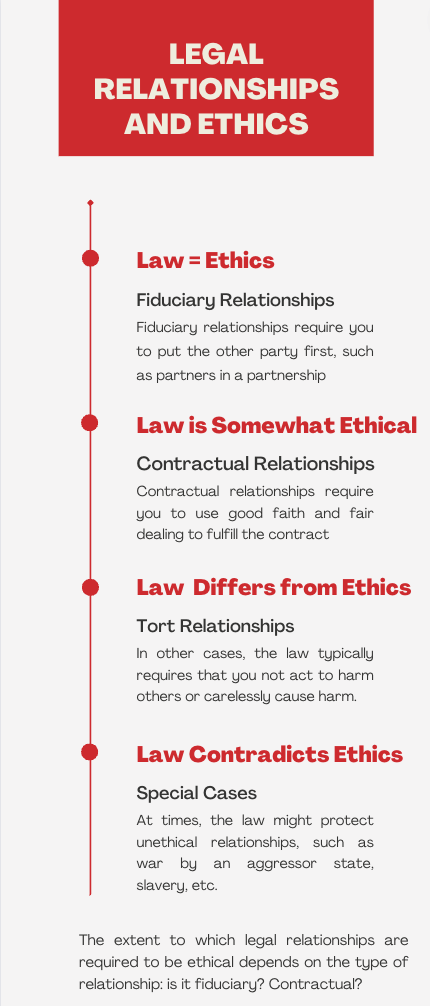Part 1: The Relationship of Legal and Ethical Duties
9 Do ethical duties change as your business relationship changes?
To what extent the law requires you to be ethical depends on your relationship with others. At times, the law may require behavior that would be accepted by most people as ethical. At other times, the law sets a very low ethical bar. Finally, as we discussed earlier, at times the law may sanction or protect egregiously unethical behavior. The diagram summarizes some of these relationships.
At the top of the diagram are “fiduciary” relationships. Although we will consider these in more detail in the next Part, a fiduciary relationship is one in which the law requires you act with loyalty and care for another. Examples include the duty of a corporation to its shareholders, the duty of employees to an employer, a partner to other partners in a general partnership, a general partner to a limited partner in a limited partnership, managing members of an LLC to members of an LLC, and (perhaps) the duty between spouses.
Notably, employers do not owe employees this same duty, nor do shareholders to the corporation! That is to say, fiduciary duties of loyalty and care are not always two-way or bi-directional. For example, employers must only offer employees the care legally required, such as not discriminating in unlawful ways and paying legally required wages. Employees, on the other hand, must exercise loyalty, such as by not developing competing products for those the company sells, and care, taking reasonable diligence in their work for the company.

Next, being in a contractual relationship with someone does not necessarily create a fiduciary relationship. Rather, contractual parties have a general obligation to act in good faith and under principles of fair dealing to achieve the purpose of the contract. They do not need to put the needs of their contracting parties above their own, and do not owe duties of loyalty and care outside the terms of the contract. In this sense, contractual parties owe each other duties that do not have the same legal requirements to behave ethically as those in a fiduciary relationship.
Below that, parties with no fiduciary or contractual relationships remain bound by the principles of tort law. In general, tort law requires that you not act to affirmatively harm others, and that you not act negligently.[1] Many people would consider this part of an ethical duty, but not sufficient to act completely ethically. For instance, tort law does not impose a duty to rescue a drowning child unless you caused the child to fall in the water. Ethics would likely require a stronger response!
Finally, sometimes the law may protect or sanction behavior that many people find deeply unethical. When this is the case, there is often pressure to change the laws.

Exercises
- Why might it make sense for employees to owe employers fiduciary duties, but not vice versa? Why might it not make sense?
- Repeat question 1, but for a corporation to its shareholders.
- Negligence occurs when a breach of a duty causes damages, and so uses similar language to that we use to emphasize ethics. Yet the duty to not be careless is likely a "moral minimum", upon which most ethical codes would use as a baseline rather than an endpoint. ↵

